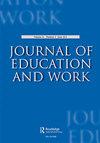工作不稳定性与学生倦怠的关系:一个系列间接效应模型
IF 1.7
Q2 EDUCATION & EDUCATIONAL RESEARCH
引用次数: 0
摘要
许多研究都研究了不稳定就业与成年人幸福感之间的关系,但对在职学生的这种关系知之甚少。样本224人(年龄21岁;68%的女性),我们评估了四个领域(即工作不安全感,薪酬,条件,灵活性)对工作不稳定性的自我感知,并测试了四个领域与学生倦怠之间的关系,以及这些关系是否可以通过更高水平的工作和经济压力以及睡眠中断来解释。工作不安全感本身就直接或间接地与职业倦怠相关(通过工作和经济压力以及睡眠质量差)。与经济压力(不安全感,薪酬)、工作压力(不安全感,灵活性)和睡眠质量(不安全感)相关的不稳定性;经济和工作压力与睡眠质量有关;睡眠质量与倦怠有关。通过分解工作不稳定性结构,研究结果更好地理解了从事低质量、不稳定的工作与学生幸福感的关系。本文章由计算机程序翻译,如有差异,请以英文原文为准。
The relationship between job precariousness and student burnout: a serial indirect effects model
ABSTRACT Much research has examined the association between precarious employment and wellbeing in adults, but little is known about this relationship in working students. Using a sample of 224 (MAge 21 years; 68% female), we assessed self-perceptions of job precariousness across four domains (i.e., job insecurity, remuneration, conditions, flexibility) and tested the relationships between the four domains and student burnout, and whether these relationships could be explained sequentially by higher levels of job and financial strain and sleep disruption. Job insecurity alone related both directly and indirectly to burnout (via job and financial strain and poor sleep quality). Precariousness related to financial strain (insecurity, remuneration), job strain (insecurity, flexibility), and sleep quality (insecurity); financial and job strain related to sleep quality; and sleep quality related to burnout. By decomposing the job precariousness construct, the findings provide an improved understanding of how working in low quality, precarious jobs is related to student wellbeing.
求助全文
通过发布文献求助,成功后即可免费获取论文全文。
去求助
来源期刊

Journal of Education and Work
EDUCATION & EDUCATIONAL RESEARCH-
CiteScore
2.70
自引率
14.30%
发文量
40
期刊介绍:
The Journal of Education and Work is an international forum for academic research and policy analysis which focuses on the interplay of the education and economic systems. The journal examines how knowledge, skills, values and attitudes both about and for work and employment are developed within the education system. The journal also explores the various forms of industrial training and accreditation in the economic system, including changes in the economic and industrial infrastructure which influence the type of employees required. Work in the informal economy is also included.
 求助内容:
求助内容: 应助结果提醒方式:
应助结果提醒方式:


